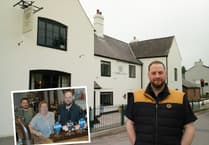FRENCH authorities have applied to extradite a former Forest journalist from Ireland after he was sentenced to 25 years in jail for murder by a Paris court earlier this year.
Ian Bailey, who used to live in Newent, was convicted in his absence last May of the 1996 Christmas time killing of Sophie Toscan du Plantier, wife of the head of the Paris Film Festival and a friend of President Mitterand.
The 39-year-old mum-of-one was found bat- tered to death in her nightdress outside her Cork Riviera clifftop cottage two miles from Bailey’s Schull home, where he still lives with Welsh artist partner Jules Thomas.
Bailey denies any involvement in Ms Du Plantier’s death and no one has ever been charged by Irish authorities, who twice turned down French extradition requests prior to his conviction by the Paris court.
The 62-year-old described May’s three-day Cour d’Assises hearing -in the Palais de Justice as a “show trial”.
Now French authorites have made a fresh bid to the High Court in Ireland, which will decide later this month whether it will back a warrant seeking his extradition to France for the 23-year-old murder of the film producer.
Irish Minister for Justice lawyers told the High Court in Dublin on Monday (December 2) that they had received a third European Arrest Warrant from French authorities seeking Mr Bailey’s surrender.
Mr Justice Donald Binchy described the circumstances of the extradition request as probably “unique”, and adjourned the application for legal submissions from the French authorities and Bailey’s lwayers.
The first extradition attempt resulted in a Supreme Court finding that Bailey’s surrender was prohibited because the alleged offence was committed outside French territory.
A second attempt was dismissed as an “abuse of process” by the High Court in 2017, with Mr Justice Tony Hunt saying Ireland’s Director of Public Prosecutions had concluded “long ago that there is no basis for either (a) charge or trial on this matter.”
When Ms Toscan du Plantier’s body was found on December 23, 1996, Bailey was the first journalist on the scene, filing stories to Irish and French papers.
Although he was later arrested twice by Irish police, it was ruled that there was “no evidence” to charge him.
French authorities took the case up in 2008, finally leading to this year’s trial in Paris which just two Irish witnesses attended.
Bailey, who moved from the Forest in the early 1990s and makes pizza to sell at a local market and writes poetry, told Irish broadcaster RTE that claims he was the killer were a “bundle of lies”.
But convicting him, Judge Frederique Aline said there was “significant evidence” of Bailey’s guilt.
The case has seen allegations of incompetence and corruption against Irish police.
Shop owner Marie Farrell, the only witness to put him near the scene on the night of the killing, later retracted her claim, saying she had been groomed and bullied into giving false evidence.
The judge sitting with two magistrates in Paris relied primarily on read statements, including Ms Farrell’s evidence which was later retracted.
The court was told of scratches Bailey had on his hands and forehead on December 23, 1996, the day that Ms Toscan du Plantier’s body was found.
He said they were from killing and plucking three turkeys and cutting down a Christmas tree, although the Paris court heard that witnesses had seen him playing a bodhran drum in the pub the night before with rolled-up sleeves and had observed no scratches.
One of the two witnesses to attend, Bill Fuller, told the Paris court Bailey had recounted a scenario of the killing the day after the body was found.
He claimed that Bailey said: “You did it… you saw her in Spar and she got you excited as she walked through the aisles
“You went to her place to see what you could get, but she wasn’t interested so you attacked her.
“She tried to escape and you ran after her.
“You threw something at the back of her head and you went further than you planned to.”




